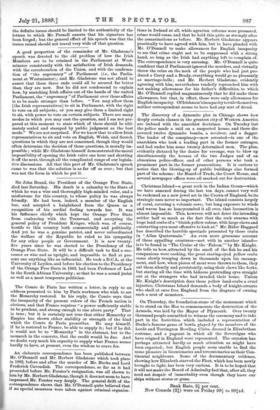A good proportion of the remainder of Mr. Gladstone's speech
was devoted to the old problem of how the Irish Members are to be retained in the Parliament at West- minster consistently with the satisfaction of Irish demands, with the corroboration of the Union, and with the confirma- tion of " the supremacy" of Parliament (i.e., the Parlia- ment at Westminster) ; and Mr. Gladstone was not afraid to assert that these three ends could all be secured far better than they are now. But he did not condescend to explain how, by snatching Irish affairs out of the hands of the united Parliament, the " supremacy " of Parliament over those affairs is to be made stronger than before. " You may allow them {the Irish representatives] to sit in Parliament, with the right to vote on all subjects; or you may give them a limited right to sit, with power to vote on certain subjects. There are many modes in which you may cast the question, and I am not pre- pared at this moment to state which of these should be ulti- mately sealed and stamped by public judgment as the best mode." We are not surprised. For we know that to allow Irish representatives to sit and vote on English, Welsh, and Scotch questions in which they are not concerned, though they would often determine the decision of those questions, is morally im- possible ; while Mr. Gladstone himself demonstrated the moral impossibility of opening the Irish valve one hour and shutting it off the next, through all the complicated range of our legisla- tive discussions. All that this part of Mr. Gladstone's speech came to was that the solution is as far off as ever ; but that was not the form in which he put it.


































 Previous page
Previous page